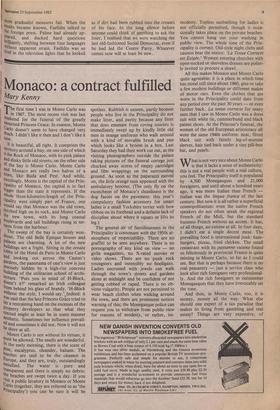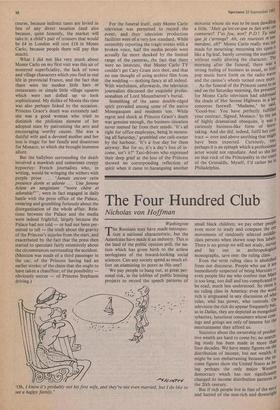Monaco: a contract fulfilled I Mary Kenny T he first time
I was in Monte Carlo was
in 1967. The most recent visit was last weekend for the funeral of the greatly Mourned Princess Grace. In essence, Monte Carlo doesn't seem to have changed very
much. I didn't like it then and I don't like it now.
It is beautiful, all right. It comprises the territory around a bay, on one side of which is the Rock of Monaco, with its pink palace and dinky little old streets; on the other side of the bay is Monte Carlo. Monte Carlo and Monaco are really two halves of a town, like Buda and Pest. And while, Puzzlingly, Monte is the capital of the Prin. ciPality of Monaco, the capital is in fact bigger than the state it represents. If the Whole three-kilometre-length of the Prin. eiPality were simply part of France, one would say that Monaco was the old town, Perched high on its rock, and Monte Carlo
boulevards new town, with its long coastal
°oulevards and tall buildings rising in ter- races from the harbour.
The sweep of the bay is certainly won- drous. The old Belle Epoque houses and. Palaces are charming. A lot of the new buildings are a fright. Sitting in the ornate lobby of the Hotel de Paris in Monte Carlo and looking out across the Casino's gardens, the panorama of one's view is just Precisely hidden by a high-rise concrete building of the utilitarian school of archi- tecture. 'Puts you in mind of H-Block, doesn't it?' remarked an Irish colleague from behind his glass of brandy. 'H-Block without the style, I would-say.' Indeed: it was said that the late Princess Grace tried to lay a restraining hand on the excesses of the Property developers so that what they erected might at least be in some manner aesthetic. Sometimes her influence prevail- ed and sometimes it did not. Now it will not be there at all.
Monte Carlo is not without its virtues, it must be allowed. The smells are wonderful. in the early morning, there is the scent of Pine, eucalyptus, oleander, balsam. The beeches are said to be the cleanest in Europe, and they are, truly, outstandingly unsullied. The water is pure and transparent and there is simply no debris: the beaches are swept twice a day. If you visit a public lavatory in Monaco or Monte Carlo (together, they are referred to as 'the Principality') you can be sure it will be
spotless. Rubbish is unseen, partly because people who live in the Principality do not make litter, and partly because any litter that does emanate from roving tourists is immediately swept up by kindly little old men in orange uniforms who walk around with a kind of movable brush and pan which looks like a broom in a box. Last Saturday they had their work cut out, as the visiting photographers outside the palace taking pictures of the funeral cortege just chucked away scores of empty cartridges and film wrappings on the surrounding ground. As soon as the paparazzi moved on, the little orange men appeared with the ambulatory brooms. (The only fly on the escutcheon of Monaco's cleanliness is the dog faeces on the pavement: this year's compulsory fashion accessory for smart ladies is a small Yorkshire terrier with bow ribbon on its forehead and a definite lack of discipline about where it squats or lifts its leg.)
The general air of fastidiousness in the Principality is consonant with the 1950s at- mosphere of respectability. There are no graffiti to be seen anywhere. There is no pornography of any kind on view — no girlie magazines, no X-rated movies or video shows. There are no punk rock youngsters and ostensibly no hooligans. Ladies encrusted with jewels can walk through the town's streets and gardens alone at midnight and be confident of not getting robbed or raped. There is no ob- vious vulgarity. People are not permitted to wear beach clothes when walking around the town, and there are prominent notices warning of this; the Monegasque police can request you to withdraw from public view for reasons of modesty, or rather, im- modesty. Topless sunbathing for ladies is not officially permitted, though it occa- sionally takes place on the private beaches. You cannot hang out your washing in public view. The whole tone of the Prin- cipality is correct. Old-style night clubs and casinos bear the notice: 'La Tenue Correcte est Exigge: Women entering churches with open-necked or sleeveless dresses are polite- ly invited to procure a shawl.
All this makes Monaco and Monte Carlo quite agreeable: it is a place in which time has stood still since about 1960, give or take a few modern buildings or different makes of motor cars. Even the clothes that are worn in the Principality could date from any period over the past 30 years — or even further back. La tenue correcte for many men that I saw in Monte Carlo was a dress suit with white tie, cummerbund and black patent shoes. At the Princess's funeral, the women of the old European aristocracy all wore the same 1940s uniform: neat, fitted black suit with faintly leg-of-mutton sleeves, hair tied back under a tiny pill-box hat, and pearls.
What is not very nice about Monte Carlo is that it lacks a sense of authenticity: this is not a real people with a real culture, you feel. The Principality itself is populated by 4,500 Monegasques and 21,000 foreigners, and until about a hundred years ago, it was more Italian than French Italian was the lingua franca of the last century. But now it is all rather a superficial cosmopolitanism: even the native French speakers do not often speak the regional French of the Midi, but the standard business French without an accent. It has, of all things, no cuisine at all. In four days, I didn't eat a single decent meal. The prevailing food is international junk: ham- burgers, pizzas, fried chicken. The small restaurant with its paysanne cuisine found so felicitously in provincial France is quite missing in Monte Carlo, so far as I could see. But that is perhaps because there is no real peasantry — just a service class who look after rich foreigners very professional- ly. And the rich foreigners so outnumber Monegasques that they have irrevocably set the tone.
And then, in Monte Carlo, too, it is money, money all the way. What else should one expect of a tax paradise that makes its living from gambling and real estate? Things are very expensive, of course, because indirect taxes are levied in lieu of any direct taxation (and also because, quite honestly, the market will take it: a child's pair of trousers that would be £4 in London will cost £18 in Monte Carlo, because people there will pay that much).
What I did not like very much about Monte Carlo on my first visit was this air of moneyed superficiality, the lack of town and village characters which you find in real life in provincial France, and the fact that there were no modest little bars or restaurants or simple little village squares which were not dolled up to look sophisticated. My dislike of Monte this time was also perhaps linked to the occasion. Princess Grace's death was extremely sad: she was a good woman who tried to diminish the philistine element of her adopted state by patronising the arts and encouraging worthy causes. She was a dutiful wife and a devoted mother and her loss is tragic for her family and disastrous for Monaco, to which she brought immense allure.
But the ballyhoo surrounding the death involved a mawkish and sometimes creepy hypocrisy: French journalists who, in writing, would be wringing the withers with purple prose ... Vamais encore cette presence doree et adoree Une femme eclate en sanglotant "notre chere et adorable!", were in fact engaged in daily battle with the press office of the Palace, swearing and grumbling furiously about the disorganisation of the whole affair. Rela- tions between the Palace and the media were indeed frightful, largely because the Palace had not told — or had not been per- mitted to tell — the truth about the gravity of the Princess's injuries from the start, and exacerbated by the fact that the press then started to speculate fairly extensively about the circumstances surrounding the accident. (Mention was made of a third passenger in the car; of the Princess having had an earlier stroke; of the claim that she ought to have taken a chauffeur; of the possibility obviously untrue — of Princess Stephanie driving.)
For the funeral itself, only Monte Carlo television was permitted to record the event, and their television production facilities were of a very low standard. While ostensibly reporting the tragic events with a broken voice, half the media people were actually far more shocked by the limited range of the cameras, the fact that there were no intercuts, that Monte Carlo TV couldn't get Cary Grant into shot, and that no one thought of using archive film from the wedding — nothing fancy at all indeed. With wistfulness, afterwards, the television journalists discussed the exquisite profes- sionalism of Lord Mountbatten's burial.
Something of the same double-edged spirit prevailed among some of the native Monegasques and residents too. While regret and shock at Princess Grace's death was genuine enough, the business situation never seemed far from their minds. 'It's all right for office employees, being in mourn- ing all Saturday,' grumbled one cafe-owner by the harbour. 'It's a free day for them anyway. But for us, it's a day's loss of in- come, isn't it?' Taxi-drivers who expressed their deep grief at the loss of the Princess showed no corresponding reflection of spirit when it came to haranguing another
motorist whose sin was to be seen dawdling a little. `Mais qu'est-ce-que to fais avec ces conneries? T'es fou, non? P.D.! Tu veux que je t'arrange? Ah, ces touristes m'etn merdent, eh?' Monte Carlo really was not made for mourning: mourning sits upon it like a fig-leaf, barely covering the essentials without really altering the character. The morning . after the funeral, there was a, strong feeling of business as usual, as loud pop music burst forth on the radio waves and the casino's wheels turned once more.
As the funeral of the Princess came to an end on the Saturday morning, the presenter for Monte Carlo television had addressed the shade of Her Serene Highness in a last sonorous farewell. 'Madame,' he said' `Good-bye. You have perfectly fulfilled your contract. Signed, Monaco.' In the sea of highly dramatised obsequies, it was a curiously business-like form of leave- taking. And she did, indeed, fulfil her COn' tract over and above anything that might have been expected. Curiously, too, perhaps it is an epitaph which a professional actor would not repudiate. And so she lies on that rock of the Principality in the tomb of the Grimaldis. Myself, I'd rather be In Philadelphia.
`Oh, I know it's probably not his first wife, and they're not even married, but I do like to see a happy family.'



































 Previous page
Previous page